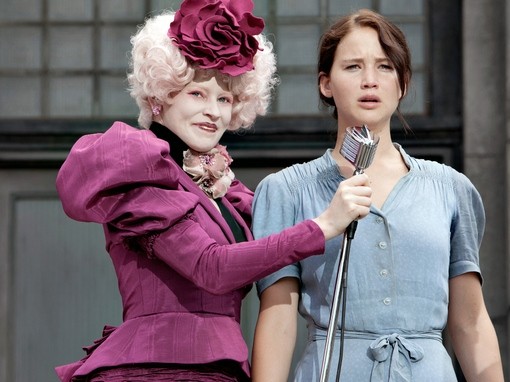Just like everyone else in America, I went to see “The Hunger Games” over the weekend. My ADHD prevented me from getting through the book until just a day before the movie, but I quickly powered through the other two books and have not been able to stop thinking about the story since.
Far too often, conservatives downplay the importance of impacting mainstream culture. Failing to participate in culture is how we make ourselves irrelevant. It’s our duty to reach people with the message of personal responsibility, small government, and transparency where they are.
And right now, they’re at “The Hunger Games,” which opened to a $152.5 million box office weekend and already has sold millions of copies. If you haven’t read the books, I highly recommend them. And read the first book before you see the movie. It’ll make more sense … maybe even change your interpretation of the story entirely.
I’m writing this from the perspective of the entire three-book narrative, not just the first feature film. If you haven’t read all three books, the following won’t make as much sense and will spoil the story for you.
MAJOR SPOILERS AHEAD regarding the book trilogy.
Both sides of the political sphere raced to claim this story as their own, the Left viewing the Capitol as the 1 percent, the elites that Occupy Wall Street was invented to demonize, and the Right seeing it as a struggle against centralized government.
After seeing the movie, I believe the books tell a much more complex story of the struggle of people against institutional power and crony capitalism.
The first and most clear layer to me was the reality TV culture element of the Hunger Games themselves; watching the destruction of others as entertainment. The truth is that while we can all act outraged by the showy weddings, divorces and drunken escapades of those “Real Housewives” and “Jersey Shore” residents, we know it’s all just for show.
They’re coached to act that way, right?
The truth is there are real people playing out their lives on television, making life decisions based on what will bring in the best ratings. We delight in their drama, their flawed nature.

Obviously, “Games” author Suzanne Collins has brought this to the extreme of watching children murder each other for the entertainment of the elites in the Capitol. The principle is the same. The residents of the Capitol no longer think of the children as human; the Games are just the way things are done, the way they’ve been done for 74 years. Little thought is given to the lives that are sacrificed along the way.
The President (played by Donald Sutherland) and officials know the impact. To the citizens, it’s just entertainment.This is apparent in Katniss’ attendants, Octavia, Venia and Flavius. In the beginning, they’re just excitable, if somewhat vapid and shallow, and clearly don’t give a thought to the fact that they’re preparing a 16-year-old girl to go fight to what will likely be her death.
When Katniss (Jennifer Lawrence) arrives to prepare for her second Games, they’ve had time to become attached to her. The joy of the Games is gone. Octavia and Venia are both removed from the room because their sobbing is upsetting Katniss. In short, Katniss became human to them, her plight was no longer a removed story that got shut off when they hit the power button on their “screens.”
In addition to the indictment of the reality TV culture, Collins paints a picture of how critical a free press is to a free society. All programming is controlled by the Capitol. The Hunger Games are filtered through their channels and presented like we would present the Super Bowl, complete with witty banter between commentators, pre-shows, post-show interviews. There is no such thing as reporting.
When the uprisings begin in District 8, the story is fiercely suppressed to avoid the spread of information that would likely fan the flames of discontent in other districts. There is barely any communication between the Districts, and there is little knowledge of the lives of those outside their borders.
Katniss and Peeta (Josh Hutcherson) are nothing but propaganda tools on their victory tour, figures presented to help quell the rebellion. Nowhere is the danger of the Capitol’s control of the airwaves clearer than after Katniss and Peeta’s second Games, when they arrive back in District 13. Peeta has been detained and is shown on television calling for a cease-fire. He’s under President Snow’s thumb, and is being used as a tool of the Capitol to stop the rebellion. The people are voiceless. The television is there to do the bidding of the Capitol.
It isn’t until Beetee, the technology wiz from the electronics specializing District 3, learns how to hack the Capitol’s airwaves that they have the ability to show images of what is actually happening in the district. The rebels understand the importance of the people seeing their message, of seeing Katniss’ face to know that there are others out there. They took matters into their own hands, and the other side is told. This is arguably what kept the rebels going.
There is even a peripheral condemnation of crony capitalism, a look at the danger of business being in bed with those in power. District 2 is said to provide “luxury goods for the Capitol,” and is therefore taken care of by the Capitol. Their children never go hungry. They are brought into alliance with the Capitol and made Peacekeepers, enforcing the laws of the Districts. The advantages are made clear in the arena, when the well-fed, well-trained tributes routinely destroy those from less well-to-do districts.
Finally, there are clear political overtones to the story, but it isn’t as cut and dried as “the people against the totalitarian state” or “the 99 percent against the 1 percent.” Reading about the citizens of the Capitol, I saw America. I saw New York, L.A., Chicago, Houston … all of us. They are a reality TV obsessed people who have never had to go hungry and obsess over make up and hair color and whether or not to wear feathers to parties.
Turn on your television and you will see those very same people.
ONE FINAL SPOILER AHEAD
At the end of book three, at the climax of the story, Katniss has the opportunity to destroy President Snow. Understanding that he will be dead shortly anyway, Katniss makes a bold decision. President Coin, of District 13, was nothing but a less offensive version of what was currently in power. Her destruction was not that of Snow’s, yet not altogether different. Katniss recognized that by killing Snow and allowing Coin to ascend to power, she would be condemning Panem to the same fate at different hands.
True freedom didn’t lie in the lesser of two evils. True freedom lied in the hands of the people, of the Districts. Until a less powerful figure was in the Capitol, this couldn’t be achieved. Coin was destroyed, and Snow simultaneously found his end on that same balcony.
“The Hunger Games” is a story about freedom. It shows how a destructive culture, lack of truth-telling media, and centralized power destroy a society. It has clearly struck a chord. Read it. Understand it. THEN go see the movie.

COMMENTS
Please let us know if you're having issues with commenting.